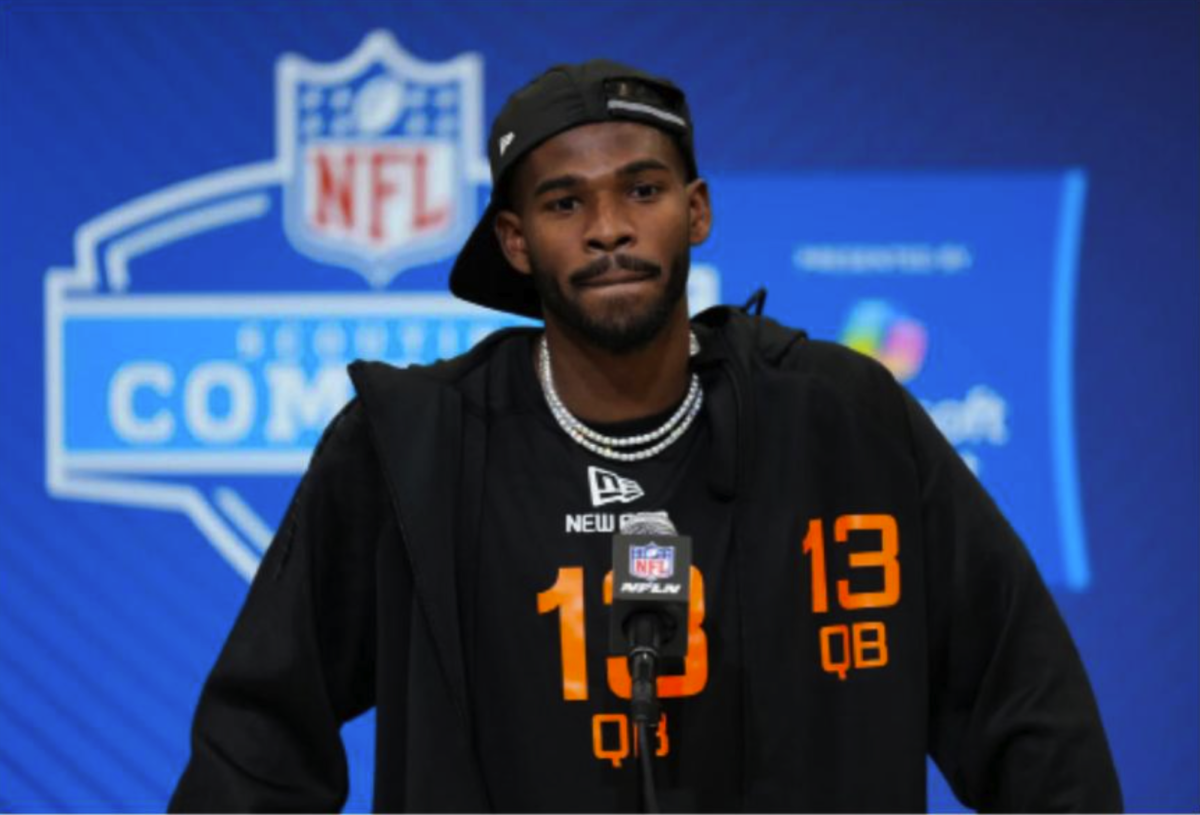
George Walker IV
Quarterback Shedeur Sanders stands at the podium in front of reporters and answers their questions
During the 2025 NFL draft, University of Colorado Boulder (CU) quarterback Shedeur Sanders and his fall to the fifth round shocked viewers across the country. His talent, which was previewed before the draft as “top-five potential” and seemed like a consensus first-round pick, fell all the way to the 5th round, where he was selected by the Cleveland Browns at pick 144.
At worst, Sanders was projected as a late first-round pick. Sure, he might not have been the generational prospect or have the immense ceiling that teams salivate for, but you don’t win the award for being the best quarterback in college football just for being the son of legendary NFL cornerback Deion Sanders, or having the most apparent personality in the NCAA. You win because you have the stats, talent, and command of the game to back it up.
During the draft, as the rounds increased and picks continued to grow, viewers still hadn’t heard Sanders’s name being announced from the podium. Then, scathing reports from anonymous NFL general managers began to slowly surface as the first day of the draft began to draw to an end. Sanders was criticized for his attitude, perceived entitlement, resistance to team interviews and private workouts, and especially for purposefully failing interviews with teams with lower records to increase the odds that he would be drafted to a better team.
It’s important for any team’s quarterback to carry himself with some swagger and confidence, but to the extent that he was described as “uncoachable” and “arrogant” by multiple organizations’ front offices? There’s a real problem with how he was treated as a hero in college, and even as a representative of the entire team.
There lies the issue in the newest generation of collegiate athletes: their predetermined mindset of already being a top-end talent that any team or school would be lucky to have is running rampant throughout the NCAA. In response, professional leagues, along with the NCAA, are reminding students to stay in line and possess the same persona that collegiate athletes have been maintaining before NIL became publicly acceptable.
Of course, even before NIL was acceptable without repercussions, athletes had been receiving payments from schools, even if they weren’t willing to admit it to the media. However, their behavior as grateful student-athletes willing to do anything to be drafted, no matter the team, is something that professional leagues want back.
Look at former Tennessee quarterback and UCLA’s new transfer quarterback, Nico Iamaleava. Originally, Iamaleava was expected to stay with Tennessee with an expected NIL deal of roughly two million dollars, but Iamaleava asked for four million dollars from the school, leading to Tennessee ignoring his offer and an eventual transfer to UCLA.
There’s nothing wrong with somebody wanting more money. However, the fact that Iamaleava was willing to challenge a football program that is known for its ability to produce multiple NFL-level quarterbacks for an extra two million dollars highlights the new generation and their inability to understand future consequences. Although Iamaleava was a highly touted recruit when entering college—ranked behind generational talent Arch Manning, who has the possibility of surpassing his Hall of Fame uncles Peyton and Eli Manning—
Beyond believing that he was the cornerstone of the school and could bargain for a larger NIL deal to stay, Iamaleava severely damaged his reputation as a loyal quarterback and strengthened the idea that he is only playing for money, especially after he was willing to sacrifice his position at a top-tier college program.
The worst part about the situation is that Iamaleava is getting paid less to attend UCLA than he was originally supposed to earn with Tennessee. Iamaleava overstepped the boundaries of how a college athlete is supposed to behave and is paying the price that comes when greed outweighs NFL dreams.
The college sports landscape is changing, and naturally, student-athletes are changing alongside the rise in NIL. However, both professional teams and the NCAA are actively pushing against a culture of entitlement among athletes, prioritizing grit and determination over arrogance. Student-athletes should look at Sanders and Iamaleava as examples of what not to do as college athletes and instead prioritize long-term goals over the possibility of picking up extra money.